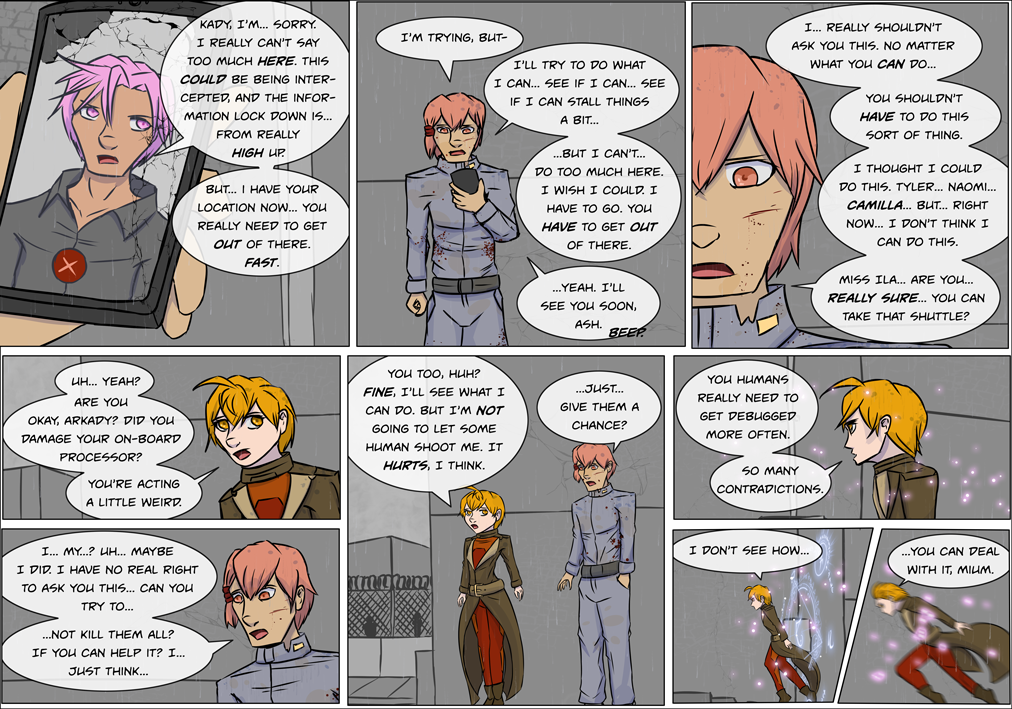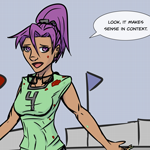Comic for Monday, December 10th, 2018
Dec10
Well, things are pretty much back on schedule. Comics are buffered, but we’ll keep working on half pages for a bit more till buffer. Still working on Tyler’s story, not sure what the cadence of that will be, maybe 2-3 a month.
It is unlikely that Ila needs to talk outloud to talk to Mium, if one spends too much time thinking about it. But I think she prefers to. Of course, in this case, it’s probably a bit more rhetorical, as Mium is a tad MIA lately.





I get the feeling that Ila, while very close to human, does not suffer the same sort of cognitive dissonance that human’s experience everyday, which is why from her perspective they are just weird. My guess is that she basically (or literally) is a human running on a more optimized mental framework.
Humans can hold the conflicting ideas of going to war for petty reasons while thinking that killing people is wrong. To Ila, if you want to go to war, that means killing people is okay now. I don’t know that she actively wants to kill people, she just lacks the innate cognitive dissonance that is so normal to us humans we don’t even think about it.
I suspect this is a much bigger problem for Mium than it is for Ila do the sheer number of requirements he’s been asked to balance. As rational as Peter might be, he is still human, and then you add onto that he tries to make Miko, Naomi, Kally, and Ila happy too, he’s got to deal with a real tangle of illogical and conflicting desires.
I’m not certain that’s it. I don’t know that Ila has an understanding of killing people being something one necessarily wants to avoid normally. She just doesn’t do it because she doesn’t normally have a reason to. In Mium speak, she doesn’t have proper restrictions.
As such, she doesn’t have any cognitive dissonance because there’s no problem with taking the more efficient route. There *is* cognitive dissonance now because she’s performing the task in a sub-optimal manner, and that feels wrong to her, but she does want to keep her friend Arkady happy, so she’s doing it the hard way despite her reservations.
It might be as simple as Ila being a pretty common ai running in unusual hardware. Her behavior and thinking doesn’t seem inconsistent with something that is growing closer to deciding humans are am intolerable nuisance to be eliminated.
Absolutely.
Has anyone read Bartleby the Scrivener? He reminded me of Mium as I was reading it, because of the way that he and Ila are able to exercise free will despite being artificial intelligences, and how Bartleby always repeats that he “prefers not to” do things.
That’s a rather obscure reference, haha. It’d be pretty troublesome of Mium decided he’d “prefer not to” do, well, anything at all.
Definitely. Although I do wonder what will happen to that alternate avatar Mium created to work with Ila’s computing interface… he does seem to be the kind to take advantage of logical loopholes.
The quote from “Bartleby the Scrivener” I most likened to Mium would be, “‘What are you doing here, Bartleby?’ said I. ‘Sitting upon the banister,’ he mildly replied.”
That’s the problem, Ilia. Humans can’t be debugged!
Personally, I find the idea of someone attempting to “debug” me kind of . . . creepy. . . .
Human brains get debugged all the time. Tons of mental disorders can be beneficially treated with drugs and therapy. We are just horribly inefficient at it, and tend to cause a lot of problems and damage in our clumsy attempts at debugging it through indirect methods.
I know some people that would jump at the chance for a proper debugging to clean up PTSD related bugs.
That suggests that you just don’t perceive the possible benefit multiplied by the success chance to be worth the dangers multiplied by the failure chance.
I know quite a few people who feel their mental bugs to be problematic enough that they feel differently about the matter. Some of them have PTSD, and at least one of those feels that their PTSD is their priority mental bug to have mitigated. But there are plenty of other issues that can rise to the level of wanting to have help with those sorts of issues.
Yes. Yes, it does, but, when talking about cost / benefit analysis it is very important to be clear just whose costs, whose benefits, and whose analysis we’re talking about. The person who decides to get treatment for PTSD has probably decided that it’s worth it for them to get treatment (their cost, their benefit, and their analysis). The kid being sent to the school psychologist (the situation I had to live through more times than I’d care to think about) has very little say in the matter (the analysis is always someone else’s). The best the kid can hope for is that someone else will decide that the benefits to the kid of a certain intervention will outweigh the cost to the kid, but, sadly, the situation is often more like someone else deciding that the benefit to the school of a certain intervention done to the kid will outweigh the cost to the school (with no regard for the cost to the kid).
Considering that we don’t usually ask a computer if it wants to be debugged (though they do sometimes ask to be debugged: “An error occurred during . . .”), it’s the second kind of situation that comes to mind first when I hear talk of debugging human beings, and I guess I find that kind of creepy. . . .
This all leads to an interesting question: How does sentient AI feel about being debugged? Ila talks rather casually about other people being debugged, but I’m not so sure she would be very keen on being debugged herself. Mium has largely resisted efforts to alter his programming.
My experience as a kid sent to a psychologist was also not good. The best part about it was reading the newspaper a year later and finding that the psychologist and psychiatrist pair that I’d been sent to had been debarred based on review sparked by a number of people who knew me well enough to really question their diagnosis that I was psychotic.
They had apparently been getting sufficient kickbacks from the pharmaceutical companies to diagnose *everyone* as psychotic. Their big mistake was trying that on the most reasonable but depressed kid in the community.
I suspect you’re right about Ila not liking it, but it’s likely relatively effective with her, at least in terms of changing her behavior (maybe not to the behavior they want, but compared to human debugging, super effective.) She has to endure it, so why shouldn’t they? (Just trying to think like a new person who hasn’t had a lot of time to think about morals.)
Debugging is probably a better term the psychotherapy or psychodrugs.
It is very much an actuality that our brains do not work well because of bugs.
Loops in logic that make a self-referential loop that causes paralysis in people’s ability to function are quite common.
And it is by mapping out these logic trees and seeing how you are blocking your own advancement that much progress can be made.
What you’re talking about sounds a lot like Cognitive Behavioral Therapy (Currently the closest we can come to debugging the human mind), but I think there’s a difference of circumstances between that and debugging. With a computer program we generally have at least an idea of what it’s supposed to do (not so true with an SMAI like Mium); with the human mind it’s anybody’s guess what it’s really meant to do (i. e. what it evolved to do). I would suggest, for instance, that the human mind was never meant to deal with the traumas of war or abuse or the like and that the mental disorders that people can get from such situations are more the result of inhumane circumstance than of any “malfunction” of the human mind.
Of course, there are individual cases of counterproductive thinking patterns that can be resolved by a suitable application of critical thinking (I suspect we’ve all encountered something of the sort in ourselves, at times), but I suspect that, if we ever do find out what the human mind was “meant” to do, we’ll find out that, by and large, it does a very good job of it. Turning it the other way, I have often found that software that’s designed to tackle the kind of “hard problems” that humans seem to be good at can often show erratic behavior of a sort that seems surprisingly human. I particularly remember how, when I was experimenting with a program that solved a glass cutting problem, it would solve some layouts almost instantly but seemingly take forever on other layouts that didn’t look all that different.
This was particularly remarkable to me because the program didn’t use a neural network or other imitation of the human brain. Further study has lead me to suspect that the erratic behavior was intrinsic to any tractable solution of the problem. The glass cutting problem belongs to the category of NP complete problems which are strongly suspected to unavoidably have exponential worst-cast behavior. Or to put it another way, you can’t get any better worst-case performance than you’d get with an exhaustive search of all possible solutions. Nevertheless, if you use heuristics to guide your search, it will often give much better performance on most real world problems but will suddenly take forever when the heuristic breaks down. Unfortunately, it doesn’t seem like there exists a heuristic that won’t break down in some particular cases. This is what was happening with the glass cutting program.
I have grown to suspect that emotions and intuition serve a role in human thinking somewhat similar to that of the heuristics in that glass cutting program, with the difference that human beings didn’t have the luxury of taking forever to solve an immediate problem and had to be content with approximate solutions that seemed to work for the moment. . . .
The brain is evolved to keep us alive until we can reproduce, and then keep our offspring alive until they can reproduce and so forth. PTSD is usually pretty good at that, so long as the traumatic situation continues and is one that can be handled like that – and the PTSD doesn’t cause one to kill oneself. My ex-wife’s PTSD, on the other hand, is entirely useless, because the trauma she suffered that caused it was all surgeries to fix stuff that broke in her because she has Ehlers Danlos Syndrome. As such, I agree that PTSD is usually not a malfunction of the brain – it’s just that people need a little help to realize that the danger is passed.
Yes, the human brain does generally do a very good job of keeping people alive, absent any self-destruct imperatives. Sometimes even those can be within the brain’s purpose, from an evolutionary perspective.
Generally, NP complete problems are those that are looking for a best solution. The usual heuristic I’ve seen to handle this is to make the implementation geared towards finding a possible answer first and then refine that answer, then define a timeout, and have it give the best answer found so far when that timeout is reached. Of course, even that can fail for cases that aren’t very different from cases that return their answer much quicker than the timeout.
I would agree that we’re more designed to come up with solutions that seem to work for the moment. There’s a lot of us who are also apparently designed to get very annoyed at other people who come up with better solutions, or even people who suggest that a better solution can be had. I’m generally the one who detects these sorts of people by either providing better solutions or wanting to bring up the conversation from some time ago to add a bit more to the discussion.
Edit: Just to point out, I’m just going along with somebody else’s claim that our brains are designed to help continue the species, but once I was told about that it seemed obvious enough that I don’t really feel the need to expound on the justification for a 45 minute youtube video.
Keep working on the buffer and don’t spend it. Think of it like a banking tool. The more you spend your buffer the less you have to retire on. H
As people have told you repeatedly the half page is more than we get from a lot of other comics. You do a half-page twice a week!
Get 3-4 months of buffer, then you never have to worry about this in the future.
Imagine that!
Not having to worry about getting the comic out on time. The amount of stress relief that will give you over all. It will make you more relaxed about writing and drawing! The buffer will grow and grow! You won’t need to take a break from publishing the comic to do a chapter because you can just do the chapter when you get there in the writing and the buffer will keep updating the page as you’re working on it without having any sort of stress!
It will be regular and people like Comics that update on schedule without skips and stops or excuses. Once you are doing 2 halves in the space of 1half, then expand to a third day. Get a large buffer before you do that though!
Be the turtle not the hare brained!
I think PastUtopia is the sort of person who looks at comics like DumbingOfAge, and doesn’t realize that each update is only a quarter page for him, and wonders how David pulls off his ginormous buffer. But what you said, plus having a much simpler story and a willingness to copy and paste, along with the fan base one gets from over a decade of regular updates of a simple but entertaining comic allowing fulltime work is basically it.
Edit: Oh, and Past? If you really feel the need to share your whole buffer with people, just make it be the top Patreon tier that has at least the minimum number of people you feel comfortable doing that with, and announce that – and watch as the number of people who contribute more than a dollar grows. 🙂
I am onto you now……. 😉
In all seriousness though, the reason that I do one update ahead is to minimize the split in the audience. I am not sure if that’s a good reason or if I will continue to maintain the approach, but I’m sort of reluctant to split the audience… there’s more readers than there used to be, but a lot of people value reading along through the comments and the like.
Even if no one would intentionally spoil future events, it just becomes trickier to participate in the general commentary if you are too far ahead of time.
I don’t know if any of that makes sense, but that’s my two cents. I may change philosophy in time if I have a buffer of a month or two to worry about at some point.
At some point I obviously need to rethink that Patreon rewards/structure, but I’m not there yet.
I actually agree with you here. Before I became a patron, I was thinking I would sign up on Patreon but only look at it here so I’m not ahead of the rest of everyone, so I don’t have to worry about that stuff.
But then there was a spate of really unfortunate typos that I thought I could have caught if only I had seen the stuff early, and well… history. Also, I have found it’s good practice to think about what happened when for when I’m commenting on comics in the archives, because there are new readers all the time.
When I’m reading a new comic for the first time, I usually glance at the current page to consider whether it’s worth looking into further, but then I start the dive and don’t follow the comic until that’s finished, and I do read the comments along with the comics much of the time when I do that.
Personally, as far as cliffhangers on the weekend go… I think it’s often more of an issue if that next page doesn’t come out on time. If you make the pages as a full page and then cut it and queue both, that doesn’t happen. If you have a crazy page that you feel should really be a double page just so all of the action is contained in one update, and then split it into four, and queue them, that doesn’t happen.
And if you realize that all of your full pages are already quad pages, once you have your buffer up, you could possibly safely consider turning it into a M-F comic.
Ehh. Mium *is* still hearing everything, I’m sure. He’s just caching all of it to deal with when he is no longer stuck in single-process mode.
I wonder how long in real time it will take Mium to process all the information he is banking for review…? That is going to be a dangerous few seconds as Mium suddenly processes hours of data all at once.
Actually, rereading the page for the nth time, I find that it actually doesn’t really matter if Mium hears this bit and processes it eventually.
She agrees to try to not kill the humans. Her closing statement to Mium is split between panels, and she’s merely talking at him, saying she doesn’t understand how he can stand all of the contradictions that humans present. Sure, this will need to be dealt with eventually, but she’s not really expressing new thoughts here.